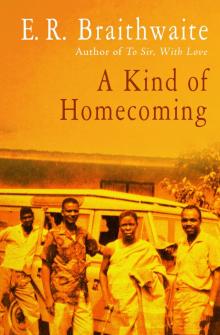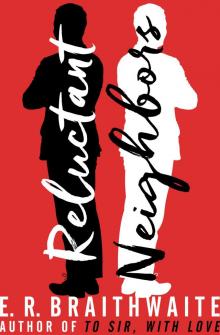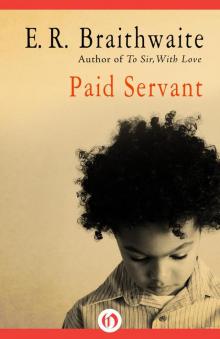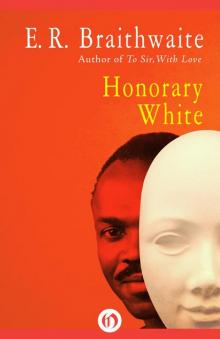- Home
- E. R. Braithwaite
To Sir With Love
To Sir With Love Read online
To Sir,
With Love
E. R. Braithwaite
Contents
Chapter One
Chapter Two
Chapter Three
Chapter Four
Chapter Five
Chapter Six
Chapter Seven
Chapter Eight
Chapter Nine
Chapter Ten
Chapter Eleven
Chapter Twelve
Chapter Thirteen
Chapter Fourteen
Chapter Fifteen
Chapter Sixteen
Chapter Seventeen
Chapter Eighteen
Chapter Nineteen
Chapter Twenty
Chapter Twenty-one
Chapter Twenty-two
About the Author
Chapter
One
THE CROWDED RED DOUBLE-DECKER BUS inched its way through the snarl of traffic in Aldgate. It was almost as if it was reluctant to get rid of the overload of noisy, earthy charwomen it had collected on its run through the city—thick-armed, bovine women, huge-breasted, with heavy bodies irrevocably distorted by frequent childbearing, faces pink and slightly damp from their early labors, the warm May morning and their own energy. There was a look of indestructibility about them, from the tip of each tinted head in its gaudy headscarf, tightly tied to expose one or two firmly fastened curls, to the solid legs and large feet which seemed rooted in the earth.
The women carried large heavy shopping bags, and in the ripe mixture of odors which accompanied them, the predominant one hinted at a good haul of fish or fishy things. They reminded me somehow of the peasants in a book by Steinbeck: they were of the city, but they dressed like peasants, they looked like peasants, and they talked like peasants. Their cows were motor-driven milk floats; their tools were mop and pail and kneeling pad; their farms a forest of steel and concrete. In spite of the hairgrips and headscarves, they had their own kind of dignity.
They joshed and chivvied each other and the conductor in an endless stream of lewdly suggestive remarks and retorts, quite careless of being overheard by me—a Negro, and the only other male on the bus. The conductor, a lively, quick-witted fellow, seemed to know them all well enough to address them on very personal terms, and kept them in noisy good humor with a stream of quips and pleasantries to which they made reply in kind. Sex seemed little more than a joke to them, a conversation piece which alternated with their comments on the weather, and their vividly detailed discussions on their actual or imagined ailments.
I sat sandwiched between a window and a very large woman whose great dimpled arms hugged her shopping bag in her lap. She kept up a ribald duet with a crony sitting immediately in front of her.
“What’ve you got for the Old Man’s dinner, Gert?”
Gert’s square body remained ponderously immobile, but she turned her head around as far as her massive neck would permit and rejoined:
“He’ll be lucky to get bread and dripping today, he will.”
“He can’t do you much good on bread and dripping, Gert.”
“Feeding him on steak and chicken won’t make no difference neither, Rose. Never mind, he keeps me back warm.”
All this was said in a tone intentionally loud enough to entertain everyone, and the women showed their appreciation by cackling loudly, rocking their bodies as much as the crowding permitted. Rose turned her head to look fleetingly at me; then leaned forward to whisper rather audibly to Gert.
“Wouldn’t mind having this lot in me stocking for Christmas, Gert.”
The chuckle which accompanied this remark shook every ounce of her like an ague, and I could feel it being conducted through the bus to me. Again Gert was forced to perform the trick of rotating her head against the uncompromisingly thick neck; her beady eyes slanted backward to bring me into orbit. She retorted, not so loudly.
“Aw, give over Rose, you wouldn’t know what to do with it, you’ve been a widow too long.”
“Speak for yourself, Gert,” Rose replied gaily. “’S like riding a bicycle, you never forget how. You wouldn’t credit it, but I figure I could teach him a thing or two.”
“Hark at her,” Gert enjoined the bus at large, who were sharing delightedly in this byplay. “Never mind, Rose, I’ll send me Alfie round to see you one of these nights; he’s not too bad when he gets around to it.”
Unable to resist the amusement I felt, I smiled inwardly at the essential naturalness of these folks who were an integral part of one of the world’s greatest cities and at the same time as common as hayseeds. There they sat, large and vigorous, the bulwark of the adventurous.
The smile must have shown on my face, for Rose glanced at me in some surprise, then leaned forward to whisper in Gert’s ear. She in turn whispered to her neighbor and soon there was a chain reaction of whispers and giggles and nudgings, as if they were somewhat surprised to discover that I had understood every word. I felt sure they could not care one way or the other; these people who had lived too intimately with poverty and danger and death would not be easily embarrassed.
The bus swung around Gardiner’s Corner and along Commercial Road. Its pace was quicker now, and the chit-chat began to flag as other thoughts intervened. At each stop now they were disembarking, returning to their homes in the strange, rather forbidding deep tangle of narrow streets and alleyways which led off from the main thoroughfare in a disordered unpremeditated pattern. Through the window I watched the fleeting panorama of dingy shop fronts and cafes with brave large superscriptions telling of faraway places. The long Commercial Road lay straight ahead, fluttering like an international maypole with the name ribbons of Greece and Israel, Poland and China, Germany and Belgium, India and Russia, and many others; Semmelweiss and Smaile, Schultz and Chin-Yen, Smith, Seibt and Litobaraki.
The bus eased to a stop. Rose shifted her shopping bag off her lap and with a grunt levered her ponderous body upright; she smiled broadly at me, and with a cheery “Ta Gert, ta girls,” she waddled towards the exit while I eased my shoulders in relief from the confining pressure of her body. God, what a huge woman.
As the bus moved slowly on, a bright-eyed little boy in school cap and blazer paused momentarily beside the vacant seat and then quickly moved a little way on in courteous deference to a slim, smartly dressed woman who followed behind. As I looked up she smiled her thanks to him and was preparing to sit when her eyes met mine. Surprise flickered briefly on her face as she straightened up and moved forward to stand in the narrow aisle beside the boy, who looked up at her with a puzzled expression.
The conductor approached with his cheery “Any more fares, please, free ride only after midnight.” He had been keeping the charwomen entertained by such witticisms throughout the journey. The woman reached into her bag, and the conductor casually remarked as he took her fare:
“Empty seat beside you, lady.”
She received her ticket with a murmured “Thank you,” but gave no sign that she had heard him.
“Seat here for you, lady.”
The conductor indicated the vacant place with a turn of his head and moved on to examine the boy’s school pass and exchange a word with the youngster. On his way back he paused to look at the woman, who returned his gaze with the cool effrontery of a patrician.
“No standing on the bus, lady.”
The conductor’s voice was deliberately louder, with an angry rasp to it; the charladies twisted and craned their necks in their efforts to discover the reason for his sudden brusqueness. The slim woman remained standing, cool, remote, undismayed by the conductor’s threatening attitude or the pointedly hostile glances directed at her by the wom
en in their immediate sympathy and solidarity with the conductor against someone who was obviously not of their class. My quick anger at the woman’s undisguised prejudice was surprisingly tinctured by a certain admiration for her fearless, superior attitude; she was more than a match for them. What a superior bitch! She looked the conductor straight in the eye and around her mouth I could discern the muscular twitchings of a suppressed smile. I guessed she was secretly enjoying herself. What a smooth, elegant, superior bitch!
Just ahead I saw a nameplate on a building, New Road. I quickly rose and said to the conductor, “Next stop, please.” He gave me an odd disapproving stare, as if I had in some way betrayed him by leaving before he could have a real set-to with the woman; I sensed that he would have liked to try humiliating her, even to putting her off the bus. He pulled the bell cord and the bus jerked to a stop, and as I stepped off the platform I saw the woman take the seat I had just vacated, stiffbacked and unruffled. By leaving I had done the conductor a favor, I thought. He’d never get the better of that female.
The bus pulled away from the stop, but I remained standing there, feeling suddenly depressed by the prospect around me. I suppose I had entertained some naïvely romantic ideas about London’s East End, with its cosmopolitan population and fascinating history. I had read references to it in both classical and contemporary writings and was eager to know the London of Chaucer and Erasmus and the Sorores Minores. I had dreamed of walking along the cobbled Street of the Cable Makers to the echoes of Chancellor and the brothers Willoughby. I wanted to look on the reach of the Thames at Blackwall from which Captain John Smith had sailed aboard the good ship Susan Lawrence to found an English colony in Virginia. I had dreamed …
But this was different. There was nothing romantic about the noisy littered street bordered by an untidy irregular picket fence of slipshod shop fronts and gaping bomb sites. I crossed Commercial Road at the traffic lights into New Road. This was even worse. The few remaining buildings, raped and outraged, were still partly occupied, the missing glass panes replaced by clapboard, or bright colored squares of tinplate advertising Brylcreem, Nugget Shoe Polish and Palm Toffee. There was rubble everywhere, and dirt and flies. And there were smells.
The smells arose from everything, everywhere, flowing together and remaining as a sickening, tantalizing discomfort. They flowed from the delicatessen shop with its uncovered trays of pickled herrings, and the small open casks of pickled gherkins and onions, dried fish and salted meat, and sweaty damp walls and floor; from the fish shop which casually defied every law of health; from the Kosher butcher, and the poulterer neat door where a fine confetti of newplucked feathers hung nearly motionless in the fetid air; and from sidewalk gutters where multitudes of flies buzzed and feasted on the heaped-up residue of fruit and vegetable barrows.
I felt sick and dirtied; only the need of reaching my destination forced me along past the shops and the smells and the multi-racial jostle of hurrying folk who ignored the flies and smells in single-minded pursuit of their business.
Near the railway viaduct the line of buildings on both sides of New Road came to an abrupt halt; the bustling thoroughfare now bisected a desert of rubble and rubbish which Nature had hurriedly and inadequately tried to camouflage with quicksprouting weeds, shrubs and ragged grass. Here and there could be seen the rusty skeleton of a spring mattress or a child’s pram, a cracked toilet bowl and a dented steel helmet, American style—relics of peace and war humbled together in rust and decay. The flies were here, too, and so were several small children, too young for school, but old and venturesome enough to grub in this perilous playground. Their eyes shone happily in grimy faces as they laughed, screamed and fought in rivalry with each other.
The games overflowed on to the sidewalk and I walked wide around a “ring-a-ring-o’-roses” who smiled happily up at me without interrupting their noisy chant. They could not have known that from their happy faces, dirty but unafraid, I took courage for the new experience I was about to face.
I soon located the narrow alleyway with the legend:
GREENSLADE SECONDARY SCHOOL
A. FLORIAN. HEADMASTER.
This alleyway opened on a small macadam forecourt, along one side of which was a small outhouse labelled “BOYS.” From it emerged a small, dark-haired, elfin-faced boy. He was dressed in blue jeans and a discolored once-white T-shirt, and on seeing me he attempted to hide the cigarette stub which he held pinched between forefinger and thumb of his right hand.
“Looking for somebody?” His Cockney voice was high-pitched and comic.
“Looking for somebody, mate?” he said again. The right hand was now safely in the pocket of his jeans, though a telltale wisp of blue smoke tendrilled its way up the skinny forearm.
“Where can I find Mr. Florian, the Headmaster?”
I could hardly keep the amusement out of my voice at the ill-concealed cigarette.
“Straight up those stairs,” and with a casual gesture the boy pointed, cigarette stub and all, towards a half-closed doorway across the forecourt. I thanked him and moved towards the door.
The stairway ended outside a green door on which was a small white card bearing the information:
Alex. Florian. Headmaster. Please knock and come in.
I knocked and hesitated; a somewhat impatient voice said, “Come in, it’s open.”
Behind a large desk sat a small man whose large head was decorated with a fine crop of carefully groomed curly white hair; the face was either tanned or olive-skinned, lean with high cheekbones and surprisingly smooth, as if the youthfulness which had deserted his hair had found permanent accommodation around the aquiline nose and full sensuous mouth; his brown eyes were large, slightly protruding, and seemed filled with a kind of wonder, as if he were on the verge of some new and exciting discovery.
I approached his desk and he stood to greet me, but that produced very little difference in his stature and I noticed that he was short and somewhat hunchbacked. He was carefully, even nattily dressed, and there was about him and the room a very pleasant orderliness quite at variance with the external surroundings. He extended a pale, strong-fingered hand and remarked smiling, “You’re Braithwaite, I suppose, we’ve been expecting you. Do sit down.” I was later to learn that the remark was typical of the man; he considered himself merely one of a team engaged in important and necessary work; he was spokesman and official representative of the team, but sought no personal aggrandizement because of that. I shook hands with him and settled down in the chair, pleased and reassured by the sincere warmth of his greeting. He opened a box on his desk and offered me a cigarette; when we had both lit up he leaned back in his seat and began:
“Hope you found this place without much difficulty; we’re rather hidden away in this little backwoods and many people have had a hard time locating us.”
“I have had no difficulty, thank you. I followed the rather detailed directions I got at the Divisional Office.”
“Good. Anyway, we’re glad to have you. I hope that when you’ve had a chance to look at us you’ll be just as pleased to stay.”
“Not much doubt about that, Sir,” I hastened to reassure him.
He smiled at my eagerness and said:
“Anyhow, I think it would be best if you had a good look around the school first, and then we’ll talk about it. Things are done here somewhat differently from the usual run, and many teachers have found it, shall we say, disquieting. Wander around just as you please, and see what’s going on, and if you then decide to remain with us, we’ll talk about it after lunch.”
With that he got up and led me to the door, his eyes dancing like those of a mischievous imp; I stepped out and he closed it behind me.
Chapter
Two
FROM THE HEADMASTER’S OFFICE A short flight of stairs led down to a narrow corridor between the auditorium on one side and some classrooms on the other. I paused f
or a moment outside the first of these classrooms, not sure where to begin, when the door was pushed violently outwards and a tall, redheaded girl rushed out into the corridor closely pursued by two others. In such a narrow space I was quite unable to dodge her wild progress, so I quickly grabbed her by the arms to avoid being bowled over and to steady her. Quickly recovering herself she shook loose, smiled impudently in my face, and with a quick “Sorry” raced down the corridor and out of sight. Her companions pulled up hastily, stopped a moment to look at me, then quickly re-entered the classroom, letting the door bang loudly shut behind them.
I was staggered by this unexpected encounter and remained where I was for a moment, unsure of what to do next. Then, deciding to take a closer look at what went on in that room, I knocked on the door, opened it and walked in. There was a general hubbub and for a little while no one seemed aware of my entry, and then, very gradually, one by one the occupants turned to stare at me.
There was no sign of anyone who looked like a teacher. About forty boys and girls were in the room. Perhaps it would be more accurate to call them young men and women, for there was about most of them a degree of adulthood, not only in terms of obvious physical development, but also in the way their clothes were worn to emphasize that development whenever possible. They stood around the room in casual postures; some were clustered around a large open empty fireplace in one corner; a few were sitting on desks or chairs in careless unscholarly attitudes. They nearly all wore a kind of unofficial uniform. Among the girls, proud of bust and uplift brassiere, this took the form of too-tight sweaters and too-long clinging skirts and flat-heeled shoes. A wide variety of hairstyles paid tribute to their particular screen favorite. It was all a bit soiled and untidy, as if too little attention were paid to washing either themselves or their flashy finery. The boys wore blue jeans and T-shirts or open-necked plaid shirts.
A large, round-faced, freckled girl left the group by the fireplace and approached me.
“If you’re looking for Mr. Hackman, he’s not here, he’s in the staffroom,” she announced. “He said when we are ready to behave one of us can go and call him.”

 A Kind of Homecoming
A Kind of Homecoming Reluctant Neighbors
Reluctant Neighbors Paid Servant
Paid Servant Billingsly
Billingsly Honorary White
Honorary White To Sir With Love
To Sir With Love Choice of Straws
Choice of Straws